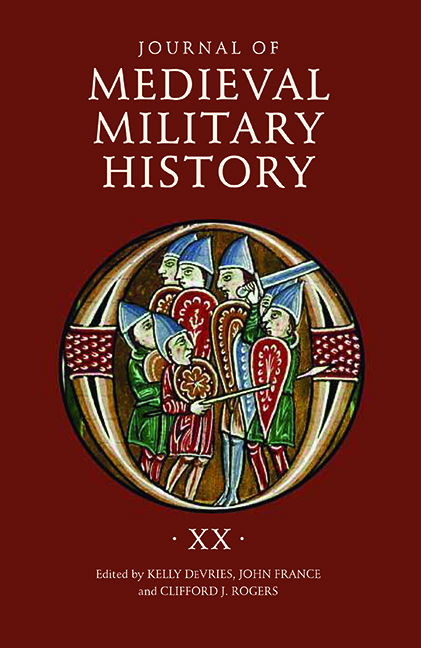Book contents
- Frontmatter
- Contents
- List of Illustrations
- 1 De velitatione bellica and the Georgian Art of War During the Reign of David IV
- 2 The Afterlife of the Medieval Christian Warrior
- 3 More Accurate Than You Think: Re-evaluating Medieval Warfare in Film
- 4 Raising the Medieval Trebuchet: Assembly Method and the Standing of a Half-scale Machine
- 5 Cum Socio Eiusdem: Military Recruitment in the Armies of Edward I Among the Sub-Gentry
- 6 Two Walls of Protection: Queen Elionor of Sicily and Bishop Berenguer de Cruïlles of Gerona During the 1359 Naval Campaigns of The War of the Two Pedros
- 7 The Lancegay and Associated Weapons
- 8 “I intend to give him battle.” Battle-Seeking in a Civil War Context: Toro (1476)
- 9 Discovery of an Early Sixteenth-Century Battle Plan from the Archdiocesan Archive in Ljubljana
- List of Contributors
- Journal of Medieval Military History 1477-545X
1 - De velitatione bellica and the Georgian Art of War During the Reign of David IV
Published online by Cambridge University Press: 07 October 2022
- Frontmatter
- Contents
- List of Illustrations
- 1 De velitatione bellica and the Georgian Art of War During the Reign of David IV
- 2 The Afterlife of the Medieval Christian Warrior
- 3 More Accurate Than You Think: Re-evaluating Medieval Warfare in Film
- 4 Raising the Medieval Trebuchet: Assembly Method and the Standing of a Half-scale Machine
- 5 Cum Socio Eiusdem: Military Recruitment in the Armies of Edward I Among the Sub-Gentry
- 6 Two Walls of Protection: Queen Elionor of Sicily and Bishop Berenguer de Cruïlles of Gerona During the 1359 Naval Campaigns of The War of the Two Pedros
- 7 The Lancegay and Associated Weapons
- 8 “I intend to give him battle.” Battle-Seeking in a Civil War Context: Toro (1476)
- 9 Discovery of an Early Sixteenth-Century Battle Plan from the Archdiocesan Archive in Ljubljana
- List of Contributors
- Journal of Medieval Military History 1477-545X
Summary
In 1089, when David IV ‘the Builder’ (1089–1125) ascended the throne, the problem of the Turkmen nomads was probably the most difficult he faced. Confrontation with Turkmens was characterized by small-scale but high-intensity clashes distinguished by dynamism and mobility. Due to this, the struggle with the nomads and the suppression of their raids required specific methods of warfare. The theoretical foundations for dealing with raids had already been developed by the Byzantine military, which in the tenth century produced a detailed and practical manual, De velitatione bellica, whose author was a comrade-in-arms of Nikephoros II Phokas (963–69). Though it is hard to show with certainty that the Georgian king knew and followed De velitatione, it is very possible that he derived some ideas about warfare from this Byzantine treatise. In the military career of David the Builder can be seen both the observance of the recommendations of De velitatione (for instance the formation of a strategic barrier and stopping the enemy in a mountainous region with small forces in Trialeti; destroying the enemy camp by a surprise attack in Upper Tao and Botora; luring and then destruction at Avchala), and creative understanding and rethinking of the treatise. There is evidence that he extended the tactical recommendations of the treatise to the strategic level, including when the king addressed the method of luring his adversary at both the tactical (Avchala episode) and strategic level (marching beyond Likhi): David the Builder took the treatise's recommendation to detain the enemy in a border area to a new height when he attacked the nomads outside the country, meaning that he successfully used the military experience of the Byzantium treatise and enriched it with his own ideas.
At the end of the eleventh century, Georgia was in an extremely difficult military-political situation: the kingdom had been defeated in a war with the Great Seljuk Sultanate and paid tribute to the Seljuks. The territory of the country was reduced, and the king's authority did not go far beyond the Likhi Range, the natural border between the western and eastern parts of Georgia. Turkic nomads raided Kartli (central Georgia) every year and settled on Georgian lands, which they turned into pastures.
- Type
- Chapter
- Information
- Journal of Medieval Military HistoryVolume XX, pp. 1 - 16Publisher: Boydell & BrewerPrint publication year: 2022

